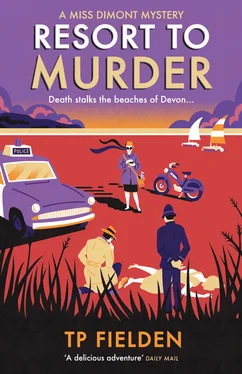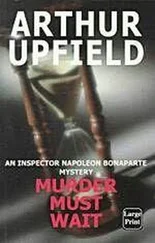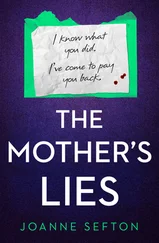PRAISE FOR TP FIELDEN
‘A fabulously satisfying addition to the canon of vintage crime’
Daily Express
‘Unashamedly cosy, with gentle humour and a pleasingly eccentric amateur sleuth’
The Guardian
‘Highly amusing’
Evening Standard
‘TP Fielden is a fabulous new voice and his dignified, clever heroine is a compelling new character’
Wendy Holden, Daily Mail
‘A golden age mystery’
Sunday Express
‘Tremendous fun’
The Independent
TP FIELDENis a biographer, broadcaster and journalist. Resort to Murder is the second in the English Riviera Murders series featuring Miss Dimont.
For Laurel Wilson Voyager, forager
CONTENTS
Cover
Map
PRAISE FOR TP FIELDEN
Title Page
About the Author
Dedication
ONE
TWO
THREE
FOUR
FIVE
SIX
SEVEN
EIGHT
NINE
TEN
ELEVEN
TWELVE
THIRTEEN
FOURTEEN
FIFTEEN
SIXTEEN
SEVENTEEN
EIGHTEEN
NINETEEN
TWENTY
TWENTY-ONE
TWENTY-TWO
TWENTY-THREE
TWENTY-FOUR
TWENTY-FIVE
TWENTY-SIX
TWENTY-SEVEN
Extract
Copyright
ONE
Pale aquamarine and milky like the waters of Venice, the sea moved slowly inland. The shoreline at Todhempstead welcomed the advance reluctantly, giving up its golden sands inch by inch, unwilling to concede a single yard of the most beautiful beach.
The body lay some way distant from the incoming tide, but sooner or later it would have to be moved.
For the moment, though, it lay there, surrounded by a frozen tableau – a small group of people immobilised by what lay at their feet. Death changes behaviour patterns, imposes a protocol of its own.
She was young, she was blonde, and she may have been pretty but for the hideous open wound that claimed half her face. Her dress was glamorous in an inexpensive sort of way, arranged around her decorously enough. It was still dry, a sure indicator it had not been here too long.
Frank Topham looked down with some discomfort. The long shallow beach had at its furthest end a high embankment, surely too far away for the victim to have fallen from and landed here. The injuries which claimed her life were too severe – that much was evident – for her to have walked or crawled to her final resting place, yet there were no footprints around the body apart from those made sparingly by the small group of eyewitnesses.
Nor was there any blood.
These contradictions jarred Inspector Topham’s usually tranquil state of mind, but were swept aside for the moment as he looked down on the wretched girl.
‘Twenty, I should say,’ he murmured to the two faceless acolytes standing at his shoulder.
‘No shoes,’ said one.
‘No handbag,’ replied Topham.
The other lit a cigarette and looked up at the sky. He didn’t seem terribly interested.
Whatever passed next between these custodians of the peace was drowned by the arrival of the up train from Exbridge, a billowing, grunting triumph of the steam engineer’s art, slowing as it made its long approach into Todhempstead Spa station.
‘Better get her away,’ Topham said to the police doctor. The man on his knees looked over his shoulder at the advancing waves and nodded.
‘No evidence,’ said Topham wretchedly. ‘No clues. We’re moving the body and there’s no clues.’
Taking his cue, the second man moved vaguely away and came back. ‘Tizer bottle.’
‘Is the label wet?’ asked Topham without even looking at it.
‘Yer.’
‘Chuck it,’ snapped the inspector. ‘No use to us.’
He moved swiftly off to the slipway where the car was parked, not wanting the men to see his face. There had been too many deaths back in the War, but wasn’t that why he had fought? So there wouldn’t be any more? It was a man’s job to die, not a woman’s.
For a moment he turned to look back at the scene below. The dead body claimed his focus, but, beyond, it was as if nobody cared that the world had lost a soul this morning. In the distance two sand-yachts raced each other across the broad beach, and overhead an ancient biplane trailed a long banner flapping from its tail. Smith’s Crisps, according to its message, gave you a wholesome happy holiday.
Far in the distance he could see a solitary female figure, dressed in rainbow colours, standing perfectly still and looking out to sea as if what it had to offer was somehow more interesting than a dead body. It was as if nobody cared.
Inspector Topham got in the car and pulled out on to the empty road. He reached Todhempstead Spa station in a matter of minutes, but already the Riviera Express was pulling out, heading on towards Exeter at a slow roll – huffing, grinding, thumping, clanging. He could get it stopped at Newton Abbot to check if there was evidence on the front buffers of contact with human flesh from the downward journey, to quiz the train guard and the driver. But they’d all be back again this afternoon on the return trip, and he doubted, given the distance of the body from the railway embankment, that this was a rail fatality. Though, with death, you could never be sure about anything.
As he drove back to the Sands, his eyes lifted for a moment from the road ahead. It was already mid-June and the lanes running parallel to the beach were bursting with joy at summer’s arrival. Though the bluebells and primroses had retreated, the hedgerows were noisy with young blackbirds testing their beautiful voices, while, beneath, newly arrived wild roses and cow parsley reached out, begging to be noticed.
How, asked the policeman, could anyone wish a young girl dead at this season, when hope is in the air and the breeze is scented with promise? His years in the desert, those arid wastes of death, might be long behind but still they cast their shadow. He drove down the slipway on to the beach, got slowly out, and nodded to his men.
‘Body away,’ said one.
‘Come on then.’
Topham removed his hat and got back in the car. His square head, doughty and in its own way distinguished, grazed the ceiling because of his ramrod-straight back. Despite the rising heat he still wore the raincoat he’d donned in the early morning when he got the call. He’d been too distracted by what he’d seen to take it off.
Too honest a man, too upright, perhaps too regimented in his thinking to see life the way criminals do, Frank Topham was both the very best of British policing and, some might argue, the worst. There was a dead woman on the beach, but if it was murder – if – the culprit might never be caught. No clues, no arrest.
No hope of an arrest.
The car approached Temple Regis, the prettiest town in the whole of Devon, and, as the inspector drove up Cable Street and over Tuppenny Row, his eyes took solace in the elegant terrace of Regency cottages whose pink brickwork blushed in the summer sunshine. Further down the hill he could hear the clanking arrival of the 10.30 from Paddington, its sooty steamy clouds shooting upwards from Regis Junction station. Life was carrying on as if nothing had happened.
Topham entered the police station at his regulation quick-march. The front office was empty apart from the desk sergeant.
‘Frank.’
‘Bert.’
‘Anything for the book?’ The sergeant had his pen poised.
Topham hesitated. ‘Accidental. Woman on T’emstead Beach.’
The other man gazed shrewdly at him. ‘You sure? Accidental?’
Topham returned his gaze evenly. ‘Accidental.’ He tried to make it sound as though he believed it.
‘Only I got a reporter in the interview room. Saying murder.’
Читать дальше












